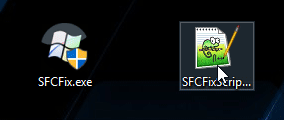iamix
Member
Windows 7 box, after spinning a long time, download/install of updates fails with 8007370A. SFC /SCANNOW fails with...
Windows Resource Protection could not perform the requested operation.
Yes, running SFC from admin prompt. Yes, trustedinstaller service is started. First round of updates worked. After reboot, Windows Update says additional critical updates are available, but now failing with 8007370A. SFCFix.exe log below. CBS folder = 100MB. Not sure of limit here. Will try to upload it. If I can't, I'll follow the instructions at the Posting Forum Instructions page. Many thanks!
(Yep, CBS.zip is too big. It will follow soon...)
----------
SFCFix version 2.4.5.0 by niemiro.
Start time: 2015-11-16 06:20:46.818
Microsoft Windows 7 Service Pack 1 - amd64
Not using a script file.
AutoAnalysis::
FIXED: Successfully repaired missing store directory C:\Windows\winsxs\amd64_microsoft-windows-comctl32-v5.resources_31bf3856ad364e35_6.1.7600.16385_ro-ro_0577819b021e44a4.
FIXED: Successfully repaired missing store directory C:\Windows\winsxs\amd64_microsoft-windows-comctl32-v5.resources_31bf3856ad364e35_6.1.7600.16385_ru-ru_07dfcd2700990774.
FIXED: Successfully repaired missing store directory C:\Windows\winsxs\amd64_microsoft-windows-comctl32-v5.resources_31bf3856ad364e35_6.1.7600.16385_sk-sk_a6fad1d3f5b2f99e.
FIXED: Successfully repaired missing store directory C:\Windows\winsxs\amd64_microsoft-windows-comctl32-v5.resources_31bf3856ad364e35_6.1.7600.16385_sl-si_a60cf38bf64d0c81.
SUMMARY: Some corruptions could not be fixed automatically. Seek advice from helper or sysnative.com.
CBS & SFC total detected corruption count: 4
CBS & SFC total unimportant corruption count: 0
CBS & SFC total fixed corruption count: 4
SURT total detected corruption count: 21
SURT total unimportant corruption count: 0
SURT total fixed corruption count: 0
AutoAnalysis:: directive completed successfully.
Successfully processed all directives.
SFCFix version 2.4.5.0 by niemiro has completed.
Currently storing 1 datablocks.
Finish time: 2015-11-16 06:23:51.488
----------------------EOF-----------------------
Windows Resource Protection could not perform the requested operation.
Yes, running SFC from admin prompt. Yes, trustedinstaller service is started. First round of updates worked. After reboot, Windows Update says additional critical updates are available, but now failing with 8007370A. SFCFix.exe log below. CBS folder = 100MB. Not sure of limit here. Will try to upload it. If I can't, I'll follow the instructions at the Posting Forum Instructions page. Many thanks!
(Yep, CBS.zip is too big. It will follow soon...)
----------
SFCFix version 2.4.5.0 by niemiro.
Start time: 2015-11-16 06:20:46.818
Microsoft Windows 7 Service Pack 1 - amd64
Not using a script file.
AutoAnalysis::
FIXED: Successfully repaired missing store directory C:\Windows\winsxs\amd64_microsoft-windows-comctl32-v5.resources_31bf3856ad364e35_6.1.7600.16385_ro-ro_0577819b021e44a4.
FIXED: Successfully repaired missing store directory C:\Windows\winsxs\amd64_microsoft-windows-comctl32-v5.resources_31bf3856ad364e35_6.1.7600.16385_ru-ru_07dfcd2700990774.
FIXED: Successfully repaired missing store directory C:\Windows\winsxs\amd64_microsoft-windows-comctl32-v5.resources_31bf3856ad364e35_6.1.7600.16385_sk-sk_a6fad1d3f5b2f99e.
FIXED: Successfully repaired missing store directory C:\Windows\winsxs\amd64_microsoft-windows-comctl32-v5.resources_31bf3856ad364e35_6.1.7600.16385_sl-si_a60cf38bf64d0c81.
SUMMARY: Some corruptions could not be fixed automatically. Seek advice from helper or sysnative.com.
CBS & SFC total detected corruption count: 4
CBS & SFC total unimportant corruption count: 0
CBS & SFC total fixed corruption count: 4
SURT total detected corruption count: 21
SURT total unimportant corruption count: 0
SURT total fixed corruption count: 0
AutoAnalysis:: directive completed successfully.
Successfully processed all directives.
SFCFix version 2.4.5.0 by niemiro has completed.
Currently storing 1 datablocks.
Finish time: 2015-11-16 06:23:51.488
----------------------EOF-----------------------






